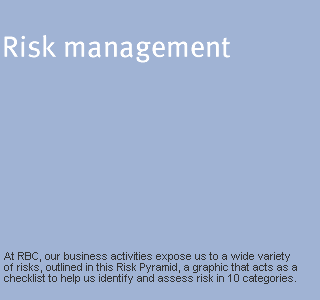 |
  |
|
Managing risk is both an art and a science at RBC; in fact, as a financial institution, it is one of our core competencies. We proactively evaluate and manage all the risks inherent in our businesses, while weighing the economic, social and environmental impact of our practices.
|
||
Structure and responsibility We have a formal structure of management and Board Committees, including the Ethics and Compliance Committee at the senior management level. These committees are supported by authorities and accountabilities assigned at the business level. Policies and procedures RBC has developed formal policies to address anti-money laundering, conflict of interest, insider trading, client and employee privacy, and “know your client” (client due diligence). We have formalized specific lending policies outlining the requirements for environmental risk management, lending to political parties and financing military materiel. We have integrated management policies and processes in place to support the assessment and management of risks. In 2004, we enhanced the whistle-blowing section of our Code to include a reporting hotline, a new requirement under the Sarbanes-Oxley Act, setting out the process by which RBC’s employees can confidentially and anonymously relay concerns about a questionable accounting or auditing matter directly to RBC’s Ombudsman. Employee training In 2004, RBC launched a new online policy and procedures library system to make it easier for employees to access policies and related documents. Crisis management In 2004, the corporate Crisis Management team set up an emergency information telephone line, available to employees and families in event of RBC-wide crisis, in case of incidents such as power blackouts, severe weather conditions, or other situations affecting our ability to access RBC offices or serve our clients. Leadership |
||
 |
||
 |